The 28th International Liquid Crystal Conference (ILCC 2022) was held in the beautiful city of Lisbon, Portugal, from 24 to 29 July 2022. Lisbon is the capital and largest city of Portugal, located on the estuary of the Tagus River and known for its culture, architecture, food, streets, etc. (). ILCC 2022 was the first ILCC organised in the hybrid mode (on-site as well as online) in the long history of the conference since 1965. Because of COVID-19, the hybrid mode was encouraged because it allowed people from all over the world who could not travel to attend the conference. In addition, the hybrid event provided greater flexibility, lower travel costs, a lower carbon footprint, and increased enhancement. The venue of the conference was NOVA School of Science and Technology, University of Lisbon (NOVA University of Lisbon), Portugal. NOVA University of Lisbon is one of Portugal’s three largest and most prestigious engineering and science schools. NOVA University of Lisbon is located in the southern part of Lisbon, 20 kilometres from the airport and well-served by public transportation. ILCC 2022 was organised jointly by the International Liquid Crystal Society (ILCS), the NOVA School of Science & Technology University of Lisbon (NOVA University of Lisbon), the University of Lisbon (UL), the School of Engineering of the Lisbon Polytechnic Institute (ISEL) and the Portuguese Liquid Crystals Society (PLCS).
Figure 1. Left: Padrão dos Descobrimentos (Discoveries Monument), Middle: Belém Tower, Right: Jerónimos Monastery in Lisbon, Portugal (Photos by Vidhika Punjani).
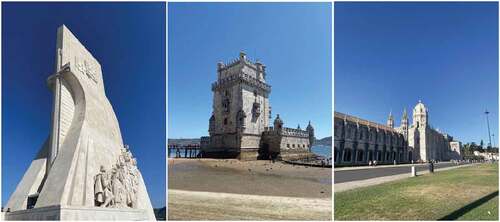
Prof. Maria Helena Godinho from the NOVA University of Lisbon served as the honorary chair of ILCC 2022. On the other hand, Prof. Margarida Telo da Gama and Prof. Carlos Rodrigues da Cruz from the University of Lisbon served as the scientific secretary and vice-chair of the ILCC 2022, respectively. The other members of the organising committee consisted of researchers mainly associated with the NOVA University of Lisbon, University of Lisbon and ISEL Lisbon Polytechnic, whereas 72 members of the International Advisory Board came from all over the world.
On 24 July 2022, the conference began with tutorials by some of the pioneers in the field of liquid crystals (LCs). The first tutorial was given by Prof. Takashi Kato from the University of Tokyo, Japan, which focussed on the design of new functional liquid crystalline materials exhibiting electronic, mechanical, ionic, informational, and sensing functions, among other things. The five other speakers of the tutorials were Prof. Yanlei Yu (Fudan University, Shanghai, China), Prof. Jan Lagerwall (Université du Luxembourg, Luxembourg), Prof. Miha Ravnik (University of Ljubljana, Slovenia), Prof. António Martins Figueiredo Neto (University of São Paulo, Brazil) and Prof. Ivan I. Smalyukh (University of Colorado Boulder, USA). Prof. Yanlei Yu talked about bioinspired soft actuators and photo-deformable LC polymers, while Prof. Jan Lagerwall discussed colloidal LCs. Prof. Miha Ravnik delivered the tutorial on LC modelling at mesoscopic scales, whereas Prof. António Martins Figueiredo Neto illustrated new trends in lyotropic LCs. The final tutorial was delivered by Prof. Ivan I. Smalyukh, the founding fellow of the Renewable and Sustainable Energy Institute at the University of Colorado Boulder, who illustrated new LC applications in which extra-terrestrial habitats on Mars could be made possible using nanocellulose and LCs, which is quite fascinating. Apart from the tutorials, Prof. Michel Mitov (Centre d’Elaboration de Matériaux et d’Etudes Structurales (CEMES), CNRS) and Prof. Etienne Brasselet (University of Bordeaux, Bordeaux, France) gave two public lectures. All the tutorials were extremely informative and covered a broad spectrum of topics in the field of LCs. Day 1 of ILCC 2022 concluded with a musical group performance, networking session and great food. Interestingly, the organisers of ILCC 2022 put up an exhibition of LC art images selected from the art contest organised by the International Liquid Crystal Society (ILCS) from 2018 to 2022 and were open to visit throughout the conference schedule.
The technical session of ILCC 2022 began on 25 July 2022, with an opening ceremony led by Prof. Maria Helena Godinho, chair of the ILCC 2022. Prof. Maria Helena Godinho and her team did an outstanding job organising the 28th ILCC in hybrid mode, allowing researchers from all over the world to participate in the conference who were unable to attend due to COVID-19. She mentioned that 650 abstracts were submitted from 43 different countries, which is a significant number. Out of a total of 650 abstracts, 280 abstracts were accepted for oral presentations and 348 abstracts were accepted for poster presentations. Two hundred and eighty abstracts for the oral presentation included 6 tutorials, 5 plenary, 58 invited and 2 public lectures. A group photo of all the on-site participants was also taken on the second last day of the conference ().
Figure 2. Group photo of the on-site participants at the 28th International Liquid Crystal Conference (ILCC 2022) at NOVA University of Lisbon, Portugal (Photo taken by the organizers of ILCC 2022).
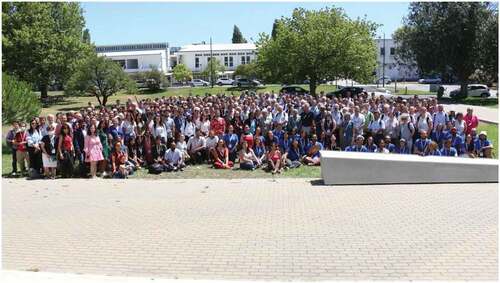
Five scientists were invited to give plenary talks. Prof. Sriram Ramaswamy of the Indian Institute of Science (IISc), Bengaluru, India, opened the technical session with a plenary lecture. He is a powerful orator who discussed the flow, order, defects, fluctuations, and chirality in active LCs (, top left). Prof. Maria Blanca Ros of the University of Zaragoza, Spain, delivered the second plenary lecture on strategies for benefiting from the supramolecular interaction of mesogens. The third plenary speaker, Prof. Randall Kamien of the University of Pennsylvania in the United States, discussed the significance of topology in LCs. Prof. Robin Selinger of Kent State University in the United States then discussed morphing liquid crystalline polymers using machine learning. The fifth plenary talk was delivered by Prof. Sung Tae Shin from Korea University, Sejong Campus, Korea, on future video displays.
Figure 3. Top Left: Plenary lecture by Prof. Sriram Ramaswamy (Indian Institute of Science, Bengaluru, India) Bottom Left: Keynote lecture by Prof. Nicholas L. Abbott (Cornell University, USA) Middle: Keynote lecture by Prof. John W. Goodby (University of York, York, United Kingdom), Top Right: Invited lecture by Prof. Noel A. Clark in virtual mode (University of Colorado and Boulder, USA) Bottom Right: Invited lecture by Prof. Matthias Lehmann (University of Würzburg, Würzburg, Germany) (Photos by Vidhika Punjani).
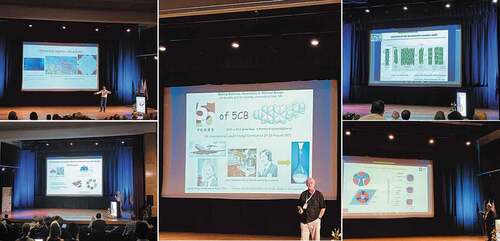
In addition, 28 scientists were invited for keynote lectures. The various topics covered during the keynote lectures included twist-bent nematic mesophases, applications of liquid crystalline elastomers, responsive photonic materials, colloidal LCs, blue phases, topological solitons in frustrated chiral nematics, etc. Keynote speaker, Prof. Nicholas L. Abbott of Cornell University in the United States spoke about the dynamical interaction of vesicles and cells with synthetic LCs (, Bottom Left), whereas Prof. John W. Goodby of the University of York in the United Kingdom discussed how most discoveries in the development of important LC materials or phases are serendipitous but still based on systematic studies of the effects of chemical structure on mesophase formation, which is quite fascinating (, Middle). Overall, the keynote lectures covered a wide range of topics and provided extensive knowledge in the fields of liquid crystalline materials and soft matter. Furthermore, 30 scientists from around the world were invited to give lectures on a wide range of topics, including director deformations, geometric frustrations, modulated phases in LCs, the use of ligands for the cores of thermotropic LCs, pillarene-based LCs and their ionic conductivity, the study of ferroelectric nematic and twist bent nematic phases in mixtures of LCs and gold nanoparticles/quantum dots, chiral LC droplets to nano-dispersions in liquid crystalline systems, etc. One of the invited lecturers from the University of Colorado and Boulder, USA, Prof. Noel A. Clark, discussed the discovery of the newly discovered LC phase of the ferroelectric nematic realm, i.e. a uniaxial smectic mesophase. He also discussed a novel phase transition from smectic A to smectic Z (, top right). Furthermore, Prof. Matthias Lehmann of the University of Würzburg, Germany, demonstrated that the unique star design LCs provide a new tool for controlling the structure of columnar mesophases at the nanoscale via free intrinsic spaces and differ significantly from the conventional linear dyad self-assembly (, Bottom Right). All of the keynote and invited lectures were extremely informative, providing a wealth of information about LCs and soft matter.
For the 5 days of the conference, 5 sessions along with the ILCS general meeting and prize distribution were organised in the morning. There were a total of three afternoon sessions with one afternoon for an excursion to the beautiful city of Lisbon and Sintra and three evening sessions. There were a total of 50 sessions, each with five parallel sessions. In addition, there were three poster sessions. Some of the glimpses of oral and poster presentations are shown in .
Figure 4. Some of the glimpses of oral and poster presentations at ILCC 2022 (Photos by Vidhika Punjani).
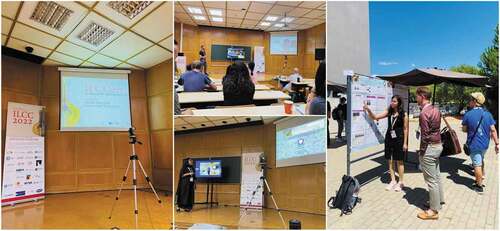
On the eve of Christmas, 24 December 2021, we lost Prof. Mark Warner, another pioneer in the field of LCs. He was given a tribute on the third day of the conference (). Prof. Peter Palffy-Muhoray and his other friends shared some of the moments of their friendship with Prof. Mark Warner. Prof. Warner was a brilliant researcher who made significant contributions to the field of liquid crystalline elastomers and their applications in artificial muscles and microrobotics. Prof. Warner made a lasting and notable contribution to the advancement in the field of LCs.
Figure 5. Tribute to Prof. Mark Warner for his outstanding contributions in the field of liquid crystalline elastomers. Left: Prof. Mark Warner, Right: Prof. Mark Warner celebrating the FRS fellowship with a bespoke cake (Photos by Vidhika Punjani).
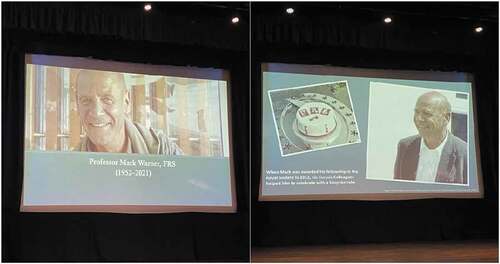
ILCS recognises researchers for their outstanding contributions to the field of LCs at ILCC. The Glenn H. Brown Prize was awarded to Dr. Yuge Huang, Dr. Muhammad Ali, Dr. Jung-Shen Tai and Dr. Taras Tuiv. The Glenn H. Brown prizes were established to encourage effective written and oral presentations of doctoral thesis findings in the field of LCs. All the Glenn H. Prize awardees gave excellent presentations about their research work. Further, Prof. Shu Yang of the University of Pennsylvania (, top left) and Dr. Teresa Lopez-Leon from the French National Center for Scientific Research (CNRS) and of the École Supérieure de Physique et de Chimie Industrielles de la Ville de Paris (ESPCI Paris) received the ILCS Mid-Career Award. ILCS Mid-Career Award: The ‘SAMSUNG’ Award and the ‘LG Display Award’ is awarded to mid-career scientists for their contributions to the field of science and technology of LCs. Prof. Robert Meyer of Brandeis University in the United States was named an Honoured Member of the ILCS in 2022 for his groundbreaking contributions to the field of LCs and their applications, particularly their ferroelectric, flexoelectric, topological defects, and chiral properties (, top right). The ILCS de Gennes Prize was the most exciting award of the award session. Prof. Slobodan Žumer of the University of Ljubljana, Slovenia, received the ILCS de Gennes Prize (, bottom right). The Pierre Gilles de Gennes ILCS Prize is awarded biannually and is the highest-ranking prize of the ILCS.
Figure 6. Top Left: Prof. Shu Yang (The winner of the ILCS Mid-Career Award from the University of Pennsylvania, USA), Bottom Left: Prof. Nicholas L. Abbott (University of Cornell, USA) and Prof. Ingo Dierking (University of Manchester, UK) announcing the honored member of the ILCC 2022, Top Right: Prof. Robert Meyer (The winner, Honored Member of the ILCS from Brandeis University, USA), Bottom Right: Prof. Slobodan Žumer from the University of Ljubljana, Slovenia (The winner of ILCS de Gennes Prize) (Photos by Vidhika Punjani).
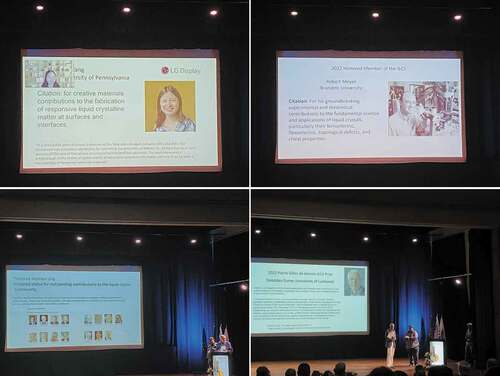
The Gala dinner with Fado music was a major highlight of the conference. The gala dinner was held at Quinta Pézinhos no Tejo. The venue is just a few feet from the Tagus River and offers a breathtaking view of Lisbon city. Some of the impressions of the gala dinner at ILCC 2022 are shown in .
Figure 7. Impressions of the ILCC 2022 conference dinner at Quinta Pézinhos no Tejo, Lisbon Portugal (Photos by Vidhika Punjani).
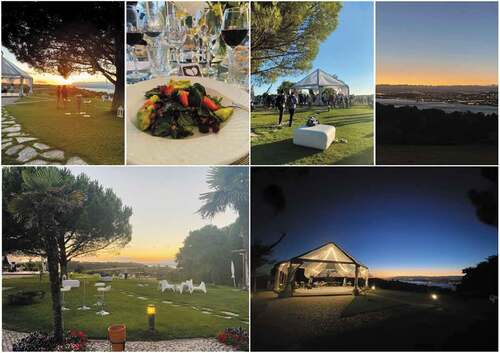
On the last day of the conference, Prof. Maria Helena Godinho hosted the closing ceremony, during which she highlighted the conference’s key events and thanked all of the volunteers, students, and faculty who helped her organise the event. Additionally, early career researchers were awarded the best poster and best oral presentation award by MDPI and RSC journal. Further, the conference ended with a short presentation regarding the 29th International Liquid Crystal Conference (ILCC 2024) by Prof. Ivan H. Bechtold as ILCC is a biennial conference. ILCC 2024 will be held in Rio de Janeiro, Brazil. The ILCC will be held in South America for the first time. The honorary chairs of ILCC 2024 will be Prof. Ivan H. Bechtold and Prof. Hugo Gallardo from the Federal University of Santa Catarina, Brazil. Some glimpses of the opening and closing ceremonies, as well as the ILCS art exhibition of ILCC 2022 at the NOVA University of Lisbon, are shown in .
Figure 8. The opening ceremony, closing ceremony and ILCC art exhibition in ILCC 2022. Left: Musical performance in the opening ceremony, Top Middle: Closing ceremony by Prof. Maria Helena Godinho, Bottom Middle: Prof. Ivan H. Bechtold presenting regarding the upcoming ILCC at Rio De Janeiro, Brazil, Top Right: ILCS Art Exhibition, Bottom Right: Closing Ceremony by the musical group, Tuna Maria. (Photos by Vidhika Punjani).
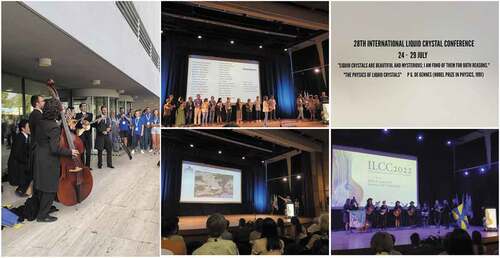
Overall, the conference was organised in a successful way by Prof. Maria Helene Godinho and her team at NOVA University of Lisbon. The conference was carefully orchestrated carefully and everything went smoothly. The bus service, the inexpensive hostel room at student halls of residence, coffee breaks and lunches, the financial support for the conferees and the presentation outfitting rooms were managed excellently. Frankly, I want to thank the organisers for selecting such a beautiful location for the Gala dinner and the Fado entertainment (the traditional music of Portugal). This venue is a few feet away from the Tagus river and offers a magnificent view of Lisbon city. I enjoyed listening to all of the lectures. However, ferroelectric nematics, one of the hottest topics in LC research, piqued my interest. I consider myself fortunate to have attended the ILCC 2022 and would like to thank the organisers, Prof. Maria Helena Godinho and ILCS, for allowing me to present my research work at the conference. I presented my research work on the second last day of the conference and I was relieved to see a large audience. This attests to the conference’s success. Finally, I would like to thank my supervisor, Dr. Santanu Kumar Pal, and IISER Mohali for all the support and encouragement.
Acknowledgments
I thank Dr. Santanu Kumar Pal, my supervisor, for his unwavering support and encouragement. My labmate, Ms. Anshika Baghla, for always being there for me.
Disclosure statement
No potential conflict of interest was reported by the author(s).
